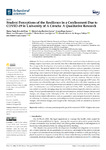Mostrar o rexistro simple do ítem
Student Perceptions of the Resilience in a Confinement Due to COVID-19 in University of A Coruña: A Qualitative Research
| dc.contributor.author | Ríos-de-Deus, María-Paula | |
| dc.contributor.author | Rodicio-García, María-Luisa | |
| dc.contributor.author | Rego-Agraso, Laura | |
| dc.contributor.author | Mosquera-González, María-José | |
| dc.contributor.author | Losa Iglesias, Marta Elena | |
| dc.contributor.author | Becerro-de-Bengoa-Vallejo, Ricardo | |
| dc.contributor.author | López-López, Daniel | |
| dc.date.accessioned | 2022-10-18T08:34:35Z | |
| dc.date.available | 2022-10-18T08:34:35Z | |
| dc.date.issued | 2022 | |
| dc.identifier.citation | Ríos-de-Deus, María-Paula, María-Luisa Rodicio-García, Laura Rego-Agraso, María-José Mosquera-González, Marta Elena Losa-Iglesias, Ricardo Becerro-de-Bengoa-Vallejo, and Daniel López-López. 2022. "Student Perceptions of the Resilience in a Confinement Due to COVID-19 in University of A Coruña: A Qualitative Research" Behavioral Sciences 12, no. 8: 294. https://doi.org/10.3390/bs12080294 | es_ES |
| dc.identifier.issn | 2076-328X | |
| dc.identifier.uri | http://hdl.handle.net/2183/31826 | |
| dc.description.abstract | [Abstract] The home confinement caused by COVID-19 has caused university students to express feelings, negative experiences, and concerns about the confinement situation they were experiencing. This prompted the development of research on resilience, which shows that it is closely related to well-being. The general objective is to determine if resilience acts as a guarantor of personal growth and, therefore, of the self-perception of well-being. The research is developed with qualitative methodology and is framed in the interpretative phenomenological analysis approach and is framed in the hermeneutic-dialectical method. The selection of participants was carried out through an intentional sampling, by non-random methods, among university students. Fifty-two students participated, 41 are women (78.84%) and 11 men (21.15%), with an average age of 20.7 years. The information was collected through a diary card in which they had to collect their experiences and prepare a short speech identifying three temporal moments of confinement: beginning, during, and end. The information was collected between 16 April and 15 May 2020. An inductive analysis was carried out, and the emerging categories were defined: personal growth, resilience, and well-being. Personal growth materializes through three subcategories: personal changes, interpersonal changes, and changes in the philosophy of life. The university students showed that the vital transformation related with resilience acts as a guarantor of personal growth and self-perception of well-being. A voluntary, conscious, and intelligent evolution of people is detected, and personal changes, interpersonal changes, and changes in the philosophy of life are identified as factors of personal growth. | es_ES |
| dc.language.iso | eng | es_ES |
| dc.publisher | MDPI | es_ES |
| dc.relation.uri | https://doi.org/10.3390/bs12080294 | es_ES |
| dc.rights | Atribución 3.0 España | es_ES |
| dc.rights.uri | http://creativecommons.org/licenses/by/3.0/es/ | * |
| dc.subject | Resilience | es_ES |
| dc.subject | Wellness | es_ES |
| dc.subject | Personal growth | es_ES |
| dc.subject | Qualitative research | es_ES |
| dc.subject | COVID-19 | es_ES |
| dc.subject | Higher education | es_ES |
| dc.title | Student Perceptions of the Resilience in a Confinement Due to COVID-19 in University of A Coruña: A Qualitative Research | es_ES |
| dc.type | journal article | es_ES |
| dc.rights.accessRights | open access | es_ES |
| UDC.journalTitle | Behavioral Sciences | es_ES |
| UDC.volume | 12 | es_ES |
| UDC.issue | 8 | es_ES |
| UDC.startPage | 294 | es_ES |
| dc.identifier.doi | doi.org/10.3390/bs12080294 | |
| UDC.coleccion | Investigación | es_ES |
| UDC.departamento | Didácticas Específicas e Métodos de Investigación e Diagnóstico en Educación | es_ES |
| UDC.departamento | Ciencias da Saúde | es_ES |
| UDC.grupoInv | Formación e Orientación para a Vida (FORVI) | es_ES |
| UDC.grupoInv | Grupo de Investigación Saúde e Podoloxía (GISAP) | es_ES |
Ficheiros no ítem
Este ítem aparece na(s) seguinte(s) colección(s)
-
Investigación (FEDU) [938]






